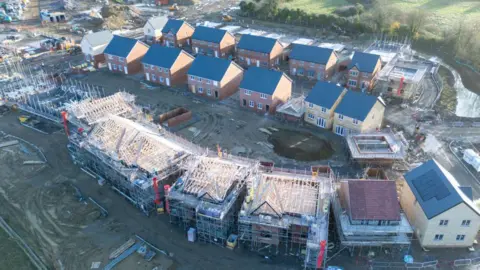
 BBC
BBCHousing Secretary Angela Rayner has said overhauling planning rules to bypass local authorities will remove “chaos and subjectiveness” from the system.
The planned changes will give Whitehall officials the power to rubberstamp development proposals without permission from council committees, as long as they comply with locally agreed plans and national regulations on standards.
House builders have broadly welcomed the streamlining but the Conservatives have accused Labour of “ignoring” communities.
Speaking to the BBC’s Sunday with Laura Kuenssberg, Rayner told councils to “get your plans in order” as the government targets its manifesto pledge to build 1.5 million new homes.
The deputy prime minister said the government will require all councils to formalise developments’ plans, the absence of which has caused developments to “get stuck in the system”.
Rayner continued: “Because we haven’t had these compulsory plans locally, we’ve seen speculative development where greenbelt land has been developed on… we’ve told councils they’ve got to have those plans.
“If developers follow the national framework, which protects the environment and looks at other elements, then they shouldn’t be stuck in the system for years.”
She pushed back on the suggestion the government is riding roughshod over councils, saying the changes were necessary to bring about what would be the biggest increase in house building since the 1950s.
“It’s going to take a lot of change to deliver that,” Rayner added.
Tory shadow Treasury minister Richard Fuller said the government’s building target is “reasonable”, but added: “If you want to achieve that, you’ve got to bring the people with you, and, unfortunately, Labour seem to be saying that Angela [Rayner] is best and local people can be ignored.”
Earlier this week, Prime Minister Sir Keir Starmer restated his pledge to build 1.5 million new homes by 2029 despite accepting it could be “a little too ambitious”.
The fast-track planning process would apply to housing proposals and associated infrastructure such as schools, if they had already been broadly agreed as part of local development plans where councils set out a strategy for land use in their areas.
If the proposals “comply” with these plans, the government has said, they could “bypass planning committees entirely to tackle chronic uncertainty, unacceptable delays and unnecessary waste of time and resources”.
According to government planning statistics, between January and March 2024 only 19% of major applications were determined within the statutory 13-week period and only 38% of minor applications were determined in the statutory eight-week period.
The push for more homes may be popular among those voters struggling to get on the housing ladder.
But even small housing projects are often opposed by people living nearby for a variety of reasons, including concerns about the impact on local schools, doctors, roads and parking.
Rayner said ministers across government had been instructed to ensure new infrastructure projects are targeted at areas which will see new housing development.
She added: “Many people will say, ‘I don’t mind housing but we don’t have the roads, we’re already struggling to get a GP appointment’. Fixing those foundations at the same time is crucial to get the buy-in from those local areas.”
Taking away the option for local people to prevent a development by making a case at a planning committee may result in a political backlash, particularly in rural areas.
Labour has already angered farmers by bringing agricultural land within the scope of inheritance tax, and needs to nurture support outside cities if it is to maintain political strength.
The Local Government Association (LGA) said that, far from planning delays being to blame for holding up house building, a million proposed homes had in fact been agreed in principle by councils in their local strategies but developers had not brought forward plans.
Councillor Adam Hug, housing spokesperson for the association representing councils, said local authorities and communities “need to be full partners in tackling the housing crisis together”.
He added this could be achieved with “new development supported by the infrastructure needed to make communities thrive and proper consultation and engagement that can help ensure local people are able to benefit”.
 Getty Images
Getty ImagesThe Home Builders Federation (HBF) said that while “democratic involvement and oversight of planning” was a “fundamental element of the process” it could be “very frustrating for applicants to have the principle of development debated over and over again”.
The housing ministry also hopes to streamline the strategic planning process and introduce a requirement for better training for members of planning committees. A Planning and Infrastructure Bill will be introduced next month.
Many in local government and the housebuilding industry believe the now-mandatory target of 1.5 million new homes by 2029 will be impossible to meet.
A Conservative spokesman said the government had “set a house building ‘target’ that the OBR has already said they can’t achieve because of their own Budget”.
The HBF agreed with the LGA that councils needed more planning resources and also called for more financial help for young home buyers.
Kate Henderson, the National Housing Federation’s chief executive, told the BBC reforms were needed to meet the “massive challenge” of hitting the government’s “really ambitious” house-building target.
She said local authorities have to “plan for the population now and for the population in the future”, and called on government to facilitate coordination across council areas to ensure social and affordable housing is provided as part of any increase in house-building.
Next week the government will announce further reforms by updating England’s planning rulebook, the National Planning Policy Framework.






